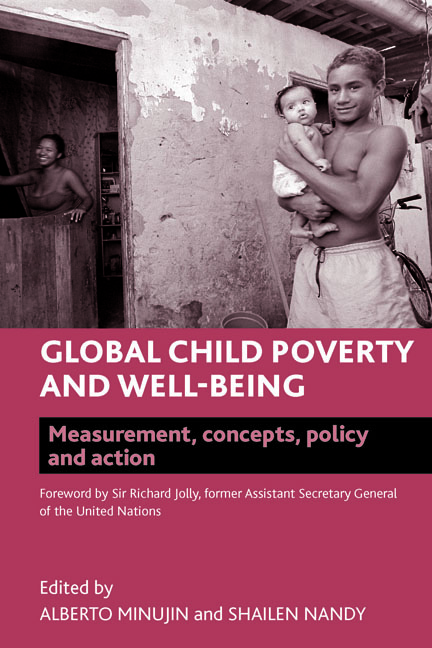twenty-one - A multidimensional response to tackling child poverty and disparities: Reflections from the Global Study on Child Poverty and Disparities
Published online by Cambridge University Press: 07 September 2022
Summary
This chapter describes the United Nations Children's Fund's (UNICEF) Global Study on Child Poverty and Disparities, a coordinated international effort to highlight the nature and extent of multidimensional child poverty, and explores how national policies can address poverty and disparities.
Introduction
Despite strong economic growth in many developing nations over the last decade, progress towards the Millennium Development Goals (MDGs) has been uneven. Inequities have persisted or even increased, in part because economic and social policies and programmes have not always reached disadvantaged communities and vulnerable groups, particularly children. The recent global economic crisis has exacerbated these trends. Emerging evidence suggests setbacks in human development gains among the poorest communities. Since children experience all forms of poverty more acutely than adults, there needs to be greater understanding of how child deprivations relate to family and community deprivations, as well as how child deprivations are linked to weaknesses in public policies.
There is a critical time in childhood where failure to intervene can have irreversible impacts on capabilities and quality of life. Although protecting the rights of all children and reducing social inequities in progress towards the MDGs are acknowledged needs, strong evidence on how to do so is sparse. It is against this backdrop that UNICEF initiated the Global Study on Child Poverty and Disparities.
The study commenced at the end of 2007. It was intended to speak on behalf of the world’s most vulnerable children, and to leverage evidence, analysis, policies and partnerships to deliver results for them. In accordance with the principle of equity for all children, the study has had the following objectives:
• to identify disadvantaged and vulnerable children using a comprehensive framework that captures the most significant deprivations;
• to better understand the determinants of child poverty and underlying disparities; and
• to influence economic and social policies that will reduce child deprivations.
The Global Study began in 39 countries. Since then, it has spurred further interest − as of 2012, 54 countries are participating (see Figure 21.1).
- Type
- Chapter
- Information
- Global Child Poverty and Well-BeingMeasurement, Concepts, Policy and Action, pp. 525 - 544Publisher: Bristol University PressPrint publication year: 2012

